 Before we can even get to the central story line on today's BradCast --- Biden's weekend win in South Carolina and voting system problems leading in to Super Tuesday, particularly in Los Angeles --- or crack open the phone lines to a bunch of calls with questions about voting on Super Tuesday, we quickly round up just some of the weekend news stories which, in a normal world, would each have merited their own entire program! [Audio link to show is posted below.]
Before we can even get to the central story line on today's BradCast --- Biden's weekend win in South Carolina and voting system problems leading in to Super Tuesday, particularly in Los Angeles --- or crack open the phone lines to a bunch of calls with questions about voting on Super Tuesday, we quickly round up just some of the weekend news stories which, in a normal world, would each have merited their own entire program! [Audio link to show is posted below.]
The news began breaking left and right after we got off air Friday and hasn't stopped through airtime today. Among the stories quickly covered at the top of today's show...
- A three-judge panel on a federal court of appeals tossed out the House of Representatives' lawsuit to force Donald Trump's former White House Counsel Don McGahn to testify under the House's lawful Congressional subpoena as a witness to Trump's attempt to kill the Robert Mueller Special Counsel probe. If the panel's 2 to 1 ruling led by two George W. Bush judges holds, it'll be the end of all Congressional oversight of the Executive Branch as we know it;
- A federal appeals court blocked Trump's "Remain in Mexico" policy for immigrants seeking asylum in the U.S., and then unblocked it moments later;
- Trump loyalist Rep. John Ratcliff (R-TX) was nominated for a second time to become Director of National Intelligence despite no intelligence experience to lead the nation's 17 intelligence agencies and after having been rejected by Senate Republicans when he was nominated the first time last year for the same role;
- The U.S. signed a peace deal with the Taliban to remove all U.S. troops from Afghanistan in America's longest war, but Rep. Barbara Lee (D-CA) the only member of Congress to have voted against the 2001 Authorization of Military Force, says Trump's "so-called 'peace deal' is anything but" and will leave thousands of troops in place. As of Monday, the Friday deal is already falling apart;
- 6 deaths from the coronavirus in the U.S. have now been reported over the weekend and into Monday, with a cluster of cases in the Seattle area, and new infections announced in New York, Chicago, Florida, Arizona and elsewhere;
- And, on Monday, the U.S. Supreme Court agreed to hear the GOP/Trump Administration challenge to the Affordable Care Act (ObamaCare) which, if successful, would completely strike down the landmark health care insurance law, leaving millions without coverage and insurance companies free to deny coverage to those with pre-existing conditions again.
All of that before we are able to even get to Joe Biden's huge reported victory at the South Carolina primary on Saturday, besting his nearest competitor (Bernie Sanders) in the Palmetto State with more than twice as many votes. In the wake of Biden's revival after his dismal performance in the first three states (Iowa, New Hampshire and Nevada), several candidates dropped out of the race, including billionaire Tom Steyer, former South Bend, IN Mayor Pete Buttigieg and MN Senator Amy Klobuchar. The last of those two announced their endorsements of Biden on Monday as centrist Democrats band together to challenge Sanders.
But what of those voters in California, Texas and a dozen other Super Tuesday states who made the mistake of voting early (despite our weeks and months of warning folks otherwise) for a candidate no longer in the race as of tomorrow's primaries in all of those states? And what of those voting centers where Los Angeles County's new, $300,000,000 unverifiable touchscreen voting systems have been failing to work at all? And why have pollworkers in L.A. been told not to talk to media, as I learned this weekend.
We open the phones to callers today (as we will again tomorrow) to hear about their early voting experiences, problems and concerns, and for questions about the new, frequently unverifiable voting systems now in use across the country (in places like South Carolina, North Carolina, Texas, Georgia, Pennsylvania and elsewhere in addition to L.A. County, the largest voting jurisdiction in the nation)? A number of callers were alarmed to learn about the flaws and failures of touchscreen computer Ballot Marking Device, including one caller who noted that, no, she didn't bother to verify her computer-marked paper ballot before casting it, believing that her work was done after verifying her choices on the touchscreen! So, a very busy hopefully interesting and informative (and, sorry, maddening) show today on 'The BradCast'!...
(Snail mail support to "Brad Friedman, 7095 Hollywood Blvd., #594 Los Angeles, CA 90028" always welcome too!)
|


 Sunday 'Total Obliteration' Toons
Sunday 'Total Obliteration' Toons Thank You For Your Attention to This Matter:
Thank You For Your Attention to This Matter: 'Green News Report' 6/26/25
'Green News Report' 6/26/25
 Mamdani Primary 'Win' Augurs New Generation of Progressives Rising: 'BradCast' 6/25/25
Mamdani Primary 'Win' Augurs New Generation of Progressives Rising: 'BradCast' 6/25/25 U.S. Authoritarianism Under-way (But We're Still Here to Fight It): 'BradCast' 6/24/25
U.S. Authoritarianism Under-way (But We're Still Here to Fight It): 'BradCast' 6/24/25 'Green News Report' 6/24/25
'Green News Report' 6/24/25 'Anti-War' Trump Attacks a Mid-East Nation on False Claims About WMD: 'BradCast' 6/23/25
'Anti-War' Trump Attacks a Mid-East Nation on False Claims About WMD: 'BradCast' 6/23/25  Sunday 'Peacemaker' Toons
Sunday 'Peacemaker' Toons Senate Health Care Cuts 'More Extreme' Than House Version: 'BradCast' 6/19/25
Senate Health Care Cuts 'More Extreme' Than House Version: 'BradCast' 6/19/25 'Green News Report' 6/19/25
'Green News Report' 6/19/25 What 'Anti-War President'? MAGA Civil War Over Trump, Iran: 'BradCast' 6/18/25
What 'Anti-War President'? MAGA Civil War Over Trump, Iran: 'BradCast' 6/18/25 Trump Calls for 'Remigration', a Codeword for 'Ethnic Cleansing': 'BradCast' 6/17/25
Trump Calls for 'Remigration', a Codeword for 'Ethnic Cleansing': 'BradCast' 6/17/25 'Green News Report' 6/17/25
'Green News Report' 6/17/25 Last Weekend Today: 'BradCast' 6/16/25
Last Weekend Today: 'BradCast' 6/16/25 Sunday 'Despot Times, Despot Measures' Toons
Sunday 'Despot Times, Despot Measures' Toons Then They Came for the U.S. Senators: 'BradCast' 6/12/25
Then They Came for the U.S. Senators: 'BradCast' 6/12/25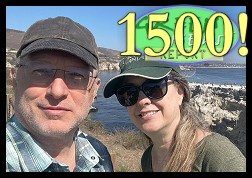 'Green News Report' 6/12/25
'Green News Report' 6/12/25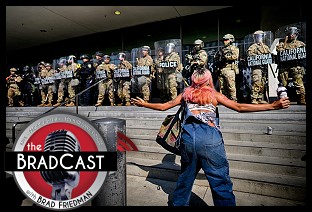 Lawless Trump Warms Up for Insurrection Act: 'BradCast' 6/11/25
Lawless Trump Warms Up for Insurrection Act: 'BradCast' 6/11/25 Trump Inciting Violence, State of Fear in L.A., Elsewhere: 'BradCast' 6/10/25
Trump Inciting Violence, State of Fear in L.A., Elsewhere: 'BradCast' 6/10/25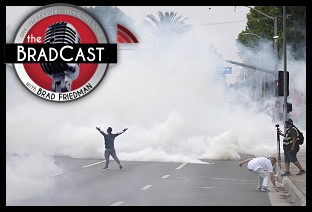 Nevermind Elon and Epstein Files, Trump Declares L.A. 'Riots'!: 'BradCast' 6/9/25
Nevermind Elon and Epstein Files, Trump Declares L.A. 'Riots'!: 'BradCast' 6/9/25 'Jesus Weeps' at Trump's
'Jesus Weeps' at Trump's 300k 'Preventable' Deaths Since Trump USAID Shutdown: 'BradCast' 6/4/25
300k 'Preventable' Deaths Since Trump USAID Shutdown: 'BradCast' 6/4/25 Storm Warnings: 'BradCast' 6/3/25
Storm Warnings: 'BradCast' 6/3/25 SCOTUS Ignores Own Precedents In Recent 'Emergency' Rulings: 'BradCast' 6/2/25
SCOTUS Ignores Own Precedents In Recent 'Emergency' Rulings: 'BradCast' 6/2/25 'A World of Tyrants, Bribes, and Influence': 'BradCast' 5/22/25
'A World of Tyrants, Bribes, and Influence': 'BradCast' 5/22/25
 VA GOP VOTER REG FRAUDSTER OFF HOOK
VA GOP VOTER REG FRAUDSTER OFF HOOK Criminal GOP Voter Registration Fraud Probe Expanding in VA
Criminal GOP Voter Registration Fraud Probe Expanding in VA DOJ PROBE SOUGHT AFTER VA ARREST
DOJ PROBE SOUGHT AFTER VA ARREST Arrest in VA: GOP Voter Reg Scandal Widens
Arrest in VA: GOP Voter Reg Scandal Widens ALL TOGETHER: ROVE, SPROUL, KOCHS, RNC
ALL TOGETHER: ROVE, SPROUL, KOCHS, RNC LATimes: RNC's 'Fired' Sproul Working for Repubs in 'as Many as 30 States'
LATimes: RNC's 'Fired' Sproul Working for Repubs in 'as Many as 30 States' 'Fired' Sproul Group 'Cloned', Still Working for Republicans in At Least 10 States
'Fired' Sproul Group 'Cloned', Still Working for Republicans in At Least 10 States FINALLY: FOX ON GOP REG FRAUD SCANDAL
FINALLY: FOX ON GOP REG FRAUD SCANDAL COLORADO FOLLOWS FLORIDA WITH GOP CRIMINAL INVESTIGATION
COLORADO FOLLOWS FLORIDA WITH GOP CRIMINAL INVESTIGATION CRIMINAL PROBE LAUNCHED INTO GOP VOTER REGISTRATION FRAUD SCANDAL IN FL
CRIMINAL PROBE LAUNCHED INTO GOP VOTER REGISTRATION FRAUD SCANDAL IN FL Brad Breaks PA Photo ID & GOP Registration Fraud Scandal News on Hartmann TV
Brad Breaks PA Photo ID & GOP Registration Fraud Scandal News on Hartmann TV  CAUGHT ON TAPE: COORDINATED NATIONWIDE GOP VOTER REG SCAM
CAUGHT ON TAPE: COORDINATED NATIONWIDE GOP VOTER REG SCAM CRIMINAL ELECTION FRAUD COMPLAINT FILED AGAINST GOP 'FRAUD' FIRM
CRIMINAL ELECTION FRAUD COMPLAINT FILED AGAINST GOP 'FRAUD' FIRM RICK SCOTT GETS ROLLED IN GOP REGISTRATION FRAUD SCANDAL
RICK SCOTT GETS ROLLED IN GOP REGISTRATION FRAUD SCANDAL VIDEO: Brad Breaks GOP Reg Fraud Scandal on Hartmann TV
VIDEO: Brad Breaks GOP Reg Fraud Scandal on Hartmann TV RNC FIRES NATIONAL VOTER REGISTRATION FIRM FOR FRAUD
RNC FIRES NATIONAL VOTER REGISTRATION FIRM FOR FRAUD EXCLUSIVE: Intvw w/ FL Official Who First Discovered GOP Reg Fraud
EXCLUSIVE: Intvw w/ FL Official Who First Discovered GOP Reg Fraud GOP REGISTRATION FRAUD FOUND IN FL
GOP REGISTRATION FRAUD FOUND IN FL



























 On today's
On today's  On today's
On today's  On today's
On today's 
 In the hours just before former Republican and current billionaire Michael Bloomberg makes his bought-and-paid-for debut on the Democratic debate stage in Las Vegas, our guest on today's
In the hours just before former Republican and current billionaire Michael Bloomberg makes his bought-and-paid-for debut on the Democratic debate stage in Las Vegas, our guest on today's  We've got a lot to catch up on on today's
We've got a lot to catch up on on today's  On today's
On today's  As usual, we cover far too much on today's
As usual, we cover far too much on today's  On today's
On today's  On Monday night, the Democratic Iowa Caucuses melted down. Actually, they didn't melt down. They worked as well as expected. It was the reporting of the results from the caucuses that melted down, almost entirely due to a smartphone app that either didn't work as planned --- or because untrained precinct captains had trouble using it for its intended purpose: to send local, transparent, fully publicly overseen caucus site results to the the Iowa Democratic Party headquarters for release to the media. Of course, as we have warned for more than 15 years, it is always a terrible idea to use new, untested, secretly-developed, nontransparent, unnecessary computer technology for mission critical, cannot-fail elections.
On Monday night, the Democratic Iowa Caucuses melted down. Actually, they didn't melt down. They worked as well as expected. It was the reporting of the results from the caucuses that melted down, almost entirely due to a smartphone app that either didn't work as planned --- or because untrained precinct captains had trouble using it for its intended purpose: to send local, transparent, fully publicly overseen caucus site results to the the Iowa Democratic Party headquarters for release to the media. Of course, as we have warned for more than 15 years, it is always a terrible idea to use new, untested, secretly-developed, nontransparent, unnecessary computer technology for mission critical, cannot-fail elections.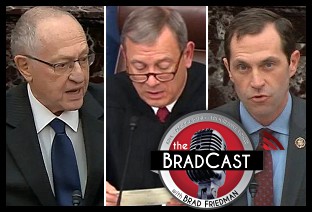 On today's
On today's 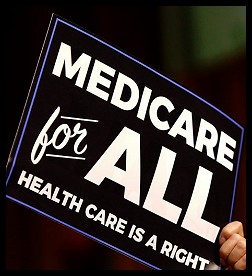 As Americans are being hoodwinked by a slick health insurance industry PR campaign, the time has come to carefully examine Medicare For All by separating myth from reality.
As Americans are being hoodwinked by a slick health insurance industry PR campaign, the time has come to carefully examine Medicare For All by separating myth from reality. On today's
On today's 












